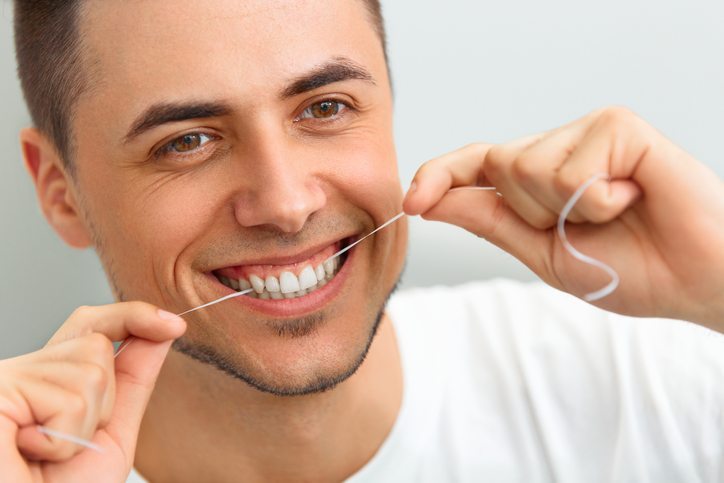Flossing Helps Reduce the Risk of Tooth Loss

At our Littleton, CO dental office, Dr. McGinty regularly tells patients about the important role flossing plays in protecting their long-term oral health and overall health. Plaque – a sticky biofilm comprised of harmful oral bacteria and food particles that linger in the mouth after eating – uses the sugars we consume to produce harmful substances that slowly erode away at the surface of our tooth enamel. The more plaque we allow to build up on the surface of our teeth, the more damage the biofilm can cause.
To keep our teeth healthy, it’s important that we regularly brush and floss every day. Brushing helps to remove plaque and food particles from the surface of our teeth and along the gum line. Flossing helps clean up the rest by removing plaque and food from areas of our mouths that a brush cannot reach – in-between our teeth and below the gum line. Practicing both of these hygiene habits is vital to ensuring the long-term health of our teeth and gums.
Unfortunately, when it comes to practicing quality oral hygiene, many patient neglect to floss regularly or at all. For whatever reason, many people simply hate flossing. In fact, a recent survey found that over 40 percent of respondents would rather perform an unpleasant task – such as waiting in line at the DMV, paying taxes, or even cleaning a toilet – rather than floss!
Fans of not having to floss were quite excited last August when the Associated Press reported that the evidence supporting flossing’s effectiveness was not reliable. Not only did this provide a perfect excuse not to floss, it also showed that the habit was never necessary to begin with.
However, a new study from researchers at the University of North Carolina, Chapel Hill, has found a connection between flossing and a lower risk of tooth loss over periods of both 5 and 10 years. As part of the study, researchers utilized data collected from the National Health and Nutrition Examination Survey 2009- 14 (NHANES), the Piedmont 65+ Dental Study (PDS), and the Dental Atherosclerosis Risk in Communities (DARIC).
A Compelling Reason to Floss
Examiners in these studies used the extent of interproximal clinical attachment (iCAL) levels equal to or greater than 3 mm and interproximal probing depth (iPD) equal to or greater than 4 mm. Data on tooth loss was available from a 10-year follow-up questionnaire in DARIC, and 5-year tooth loss was calculated based on the PDS exam. Demographic data was also collected, as was data on flossing and brushing frequencies. All analysis in the study was adjusted for education, tobacco use, diabetes, gender, race, and age.
DARIC flossers had a lower mean extend of sites with iCAL of 3 mm or greater compared to nonflossers, or 22 percent versus 26.7 percent respectively. The NHANES findings were similar, 20 percent compared to 29.5 percent. Overall, the DARIC subjects who flossed regularly at least once a week and brushed at least twice a day showed lower levels of clinical measurements when compared to nonflossers.
Additionally, the DARIC data found that nonflossers had a 1.25 increased risk for losing at least three teeth in the next decade. Additional data in the PDS showed a 3.23 increased risk of losing at least three teeth in the next five years. Based on this data, researchers were able to link flossing with a lower risk of tooth loss in study participants who brushed once or twice a day. Researchers also linked flossing with a decreased risk of tooth loss within the next five to 10 years.
Protecting Your Long-term Health
At our Littleton, CO dental office, Dr. McGinty strives to educate our patients on the important connection between our oral and overall health. A growing body of research has found that individuals suffering from tooth loss, tooth decay, and gum disease have a significantly higher risk of developing a range of chronic disease, including cardiovascular disease, stroke, diabetes, dementia, and cancer.
What studies like this tell us is just how important brushing and flossing is to not only protecting the health of our teeth and gums, but our overall health as well. Don’t neglect your health by not making the time to floss.
